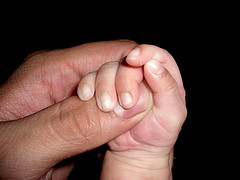The recent P lanned Parenthood scandal has refueled the discussion about the issue of abortion. To those on both sides of the aisle, the arguments seem self-evident. The rise of the ultrasound coupled with the teaching that people are created in God’s image (Gen. 1:27) is generally enough to convince Christians of the pro-life position while those who argue pro-choice point to a woman’s right to choose. Although I doubt that I could contribute anything to the discussion that would advance the dialogue in any meaningful way, it did occur to me that we rarely hear about the historic position of the Christian church regarding a man’s right to choose. Ironically, at least according to conversations that I have had with both pro-life and pro-choice friends, this may be the one thing that both sides have in common.
lanned Parenthood scandal has refueled the discussion about the issue of abortion. To those on both sides of the aisle, the arguments seem self-evident. The rise of the ultrasound coupled with the teaching that people are created in God’s image (Gen. 1:27) is generally enough to convince Christians of the pro-life position while those who argue pro-choice point to a woman’s right to choose. Although I doubt that I could contribute anything to the discussion that would advance the dialogue in any meaningful way, it did occur to me that we rarely hear about the historic position of the Christian church regarding a man’s right to choose. Ironically, at least according to conversations that I have had with both pro-life and pro-choice friends, this may be the one thing that both sides have in common.
In The Triumph of Christianity sociologist Rodney Stark notes that Christianity was attractive to women in the ancient world because of its progressive stance on gender issues. While there were degrees of inequality through the ancient world, the gospel significantly narrowed the inequality gap to the point where Christian women enjoyed a far greater equality with men as compared to pagan and Jewish counterparts (p. 124). Stark states, “Women were especially drawn to Christianity because it offered them a life that was so greatly superior to the life they otherwise would have led” (p. 122).
More to the point of this article, the author reminds us just how oppressive the Roman and Hellenistic sociological systems actually were. First century husbands held the absolute right to put to death unwanted infants (usually female) as well as the power to force a wife to have an abortion. This is reflected in the oft-quoted first century letter from one husband to his pregnant wife: “If—good luck to you!—you should bear offspring, if it is a male, let it live; if it is female, expose it. You told Aphrodisias, ‘Do not forget me.’ How can I forget you? I beg you therefore not to worry.”
This cavalier attitude towards human life is difficult to comprehend. In another work, The Rise of Christianity, Stark tries to make sense of these values: “[The] very high rates of abortion in the Greco-Roman world can only be fully understood if we recognize that in perhaps the majority of instances it was men, rather than women, who made the decision to abort” (p. 120). In the first century, abortion was mainly the product of a man’s right to choose.
Most reading this blog have probably heard something similar to what I have said in the above; but have we paused to appreciate the impact that a man’s right to choose created. According to Stark, this type of infanticide greatly reduced the number of women throughout the Roman Empire. One figure suggests that there were 131 males per 100 females in Rome. Even more distressing were the numbers throughout Italy: 140 males per 100 females (Rise, 97). Inscriptions discovered in Delphi reveal staggering statistics. Of more than 600 second-century families mentioned, only one percent (6 families) had raised two daughters.
As you can imagine, the ramifications of this shortage created a sociological nightmare. This shortage of women in the culture prompted men in the Greco-Roman world to marry girls who were far too young to even be thinking about marriage. The demographics were so skewed, in part due to the man’s right to choose, that the state penalized women under the age of fifty who did not remarry (Triumph, 130).
Christian teachings, such as people bearing the image of God, shaped the early church both theologically and sociologically. As such, believers in the first century found cause to oppose the status quo of a man’s right to choose. The earliest Christians would find it ironic that their progressive views of women’s rights would bring this issue full circle.